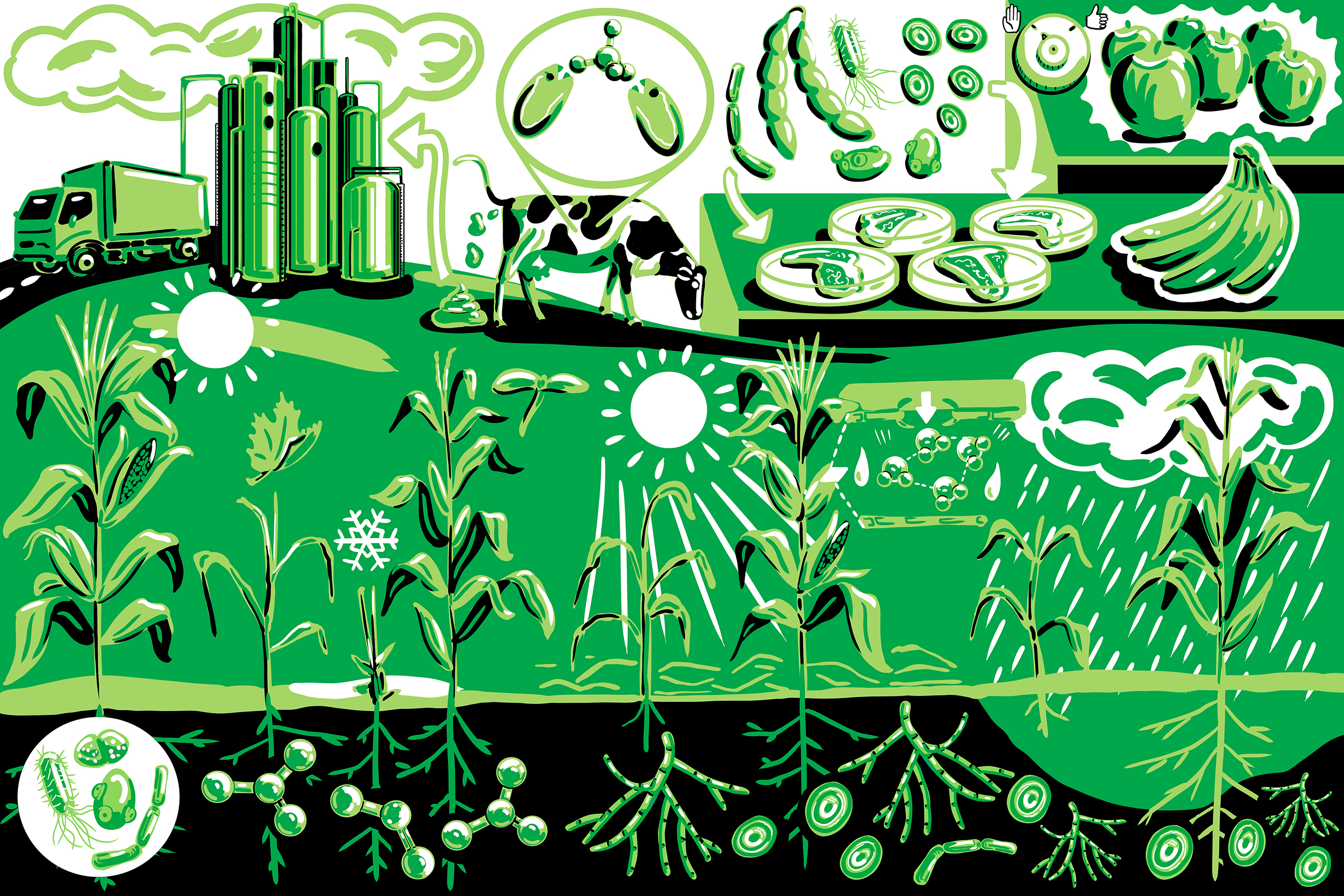Food & Agriculture
Food & Agriculture addresses specific opportunities for engineering biology to reduce greenhouse gas emissions from food production and waste and towards making agriculture and food systems more robust to climate change.
Food & Agriculture addresses specific opportunities for engineering biology to reduce greenhouse gas emissions from food production and waste and towards making agriculture and food systems more robust to climate change.
Agriculture and food systems are especially vulnerable to climate change. More intense and frequent droughts, floods, and heat waves have decimated agricultural output in all parts of the world, but have been especially detrimental to the Global South.1Mbow, C., C. Rosenzweig, L.G. Barioni, T.G. Benton, M. Herrero, M. Krishnapillai, E. Liwenga, P. Pradhan, M.G. Rivera-Ferre, T. Sapkota, F.N. Tubiello, Y. Xu. (2019). Food Security. In: Climate Change and Land: an IPCC special report on climate change, desertification, land degradation, sustainable land management, food security, and greenhouse gas fluxes in terrestrial ecosystems. View Publication.,2Organization for Economic Co-operation and Development (OECD). (2015). Poverty and Climate Change: Reducing the Vulnerability of the Poor through Adaptation. View Publication.,3EPA. (2016). Climate Impacts on Agriculture and Food Supply [Overviews and Factsheets]. View Publication. The impacts of these extreme climate events are compounded by a growing global population, leading to an acute need to improve food security. On top of this, many current agricultural practices even contribute to climate change and instability, through the production of greenhouse gases (particularly methane), production and over-application of synthetic nitrogen fertilizer, inefficient water use, and production of waste. The food and agriculture sector must leverage engineering biology to both minimize its impact on climate change and to sustain production in the face of abiotic and biotic stressors that result from climate change. The Food & Agriculture theme focuses on engineering biology research opportunities to enable the production of food and crops with lower greenhouse gas (GHG) emissions through climate-friendly biofertilizers, sustainable production of meat and meat-alternatives, crop and soil resilience, opportunities in ‘smart agriculture’, and opportunities to limit food waste or convert it to useful products. Importantly, further advancement of engineering biology for agriculture requires ongoing stakeholder engagement between biotech researchers, legislators, consumers, and agriculture producers in order to identify tolerable risk thresholds, lower barriers to adoption, and incentivize scale-up.

Engineering biology for sustainable food & agriculture. The sustainability of agriculture practices and maintaining food security is rapidly decreasing due to climate change. Engineering biology has long been employed in the food and agriculture sector, and as tools and technology advance, there are more and more opportunities for novel engineering biology solutions. These include design and implementation of engineered crops, such as those that can better withstand climate extremes, alternative sources for meat and protein from sustainable sources, reduced food- and agriculture-related greenhouse gas release by engineering crop and soil efficiency and microbiome engineering, and conversion of food and agriculture waste, like manure. Advances in microbiome engineering, in particular, could enhance plant-rhizobiome interactions for more efficient water and nutrient uptake, help to curb harmful runoff from synthetic fertilizer, and could help to alter feed sources for animals and metabolism in ruminants to reduce methane emissions. Advances in biomaterials could help solve problems related to food spoilage or to induce or prevent the timing of ripening. Further research in engineering biology could accelerate and advance cellular agriculture and alternative meat production, conserving resources and providing the public with more climate-friendly food options.
Reducing GHG emissions from agriculture is now a top priority as part of the pathway to combat climate change.4IPCC. (2021). Summary for Policymakers. In: Climate Change 2021: The Physical Science Basis. Contribution of Working Group I to the Sixth Assessment Report of the Intergovernmental Panel on Climate Change. In Press. View Publication. Methane accounts for 11% of global GHG emissions, with the agricultural sector being the largest source of methane.5EPA. (2020). Overview of Greenhouse Gases [Overviews and Factsheets]. View Publication. Current agricultural practices also generate other GHGs such as nitrous oxide from synthetic fertilizer usage. Over-application of synthetic fertilizers also leads to nitrogen run-off and eutrophication of downstream ecosystems, as has been seen in the Gulf of Mexico.6U.S. Department of Commerce. (2021). Happening Now: Dead Zone in the Gulf 2021. View Publication. This roadmap sets out breakthroughs and milestones toward developing more sustainable crops and fertilizers that prevent ecological disruption caused by run-off of water-soluble nitrates, engineering biology opportunities to reduce methane production from cattle and other ruminant sources of meat, and biobased alternative meats that reduce the need for water and other resources. Potential technical advances include engineering the plant rhizobiome to better capture nutrients from soils, engineering methanotrophs for ruminant feed or gut colonization, and generating lower-cost growth factors for cultured meat production.
This roadmap also identifies opportunities for engineering biology to be applied to the development of crops with enhanced resistance to biotic and abiotic stresses. As examples, plants could be engineered for greater drought and flood tolerance, soil microbiomes could be designed to improve plant health and survival under stressful environmental conditions (e.g., heat, high-salt content), and plants and soil microbiomes could be engineered for increased resistance to pathogens in the absence of environmentally harmful pesticides. Climate change also threatens global food supply chains by disrupting food transportation and increasing the likelihood of food spoilage; this roadmap addresses some opportunities to detect and prevent food spoilage through biosensors and advanced biomaterials.
Engineering Biology (2019) addressed related tools, technologies, and processes including the production of “clean meat” and improving soils for more efficient crop production.
View →Microbiome Engineering (2020) also addressed reducing the environmental impacts of food production through alternative food sources and reducing reliance on chemical fertilizers.
View →